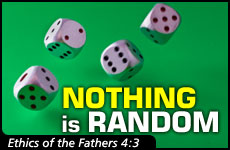 Iran’s Attack on Israel
Iran’s Attack on Israel


3 min read
Thor Heyerdahl, Rosa Parks and Ben Azzai's great lesson.
[Ben Azzai] used to say: Do not scorn any person and do not disdain any thing; for there is no person who does not have his hour, and there is no thing that does not have its place.
Ethics of the Fathers, 4:3
One doesn't often find civil rights heroine Rosa Parks and Norwegian anthropologist Thor Heyerdahl mentioned in the same breath. However, had Ben Azzai known of them, he might have made referenced both as examples of the principle he teaches in our mishna.
In 1947, Thor Heyerdahl set off from the western coast of South America in a primitive balsa raft and sailed 4,300 miles across the Pacific Ocean to Polynesia, thereby demonstrating how primitive travelers might have made such a journey long ago. 22 years later, Heyerdahl attempted to cross the Atlantic in a papyrus reed boat modeled after ancient Egyptian drawings. He successfully sailed from Morocco to Barbados on his second try. But it is his failed first attempt that has relevance to our mishna.
Heyerdahl's papyrus boat was banana-shaped, long and narrow with a tail the curled up and pointed back toward the prow. A taut line connected the tip of the tail with the central part of the boat.
The natives who helped construct the boat convinced Heyerdahl to remove the line, which had been attached according to the ancient sketches but which appeared to serve no purpose. Heyerdahl set sail in his papyrus craft, which began taking on water mid-journey and ultimately sank.
One strand of cord, apparently without purpose, made all the difference between a seaworthy vessel and a sunken ship.
Although the little boat kept its shape before it set sail, once in the water the papyrus reeds began to soften and the heavy tail section began to sag. The line that ran from the back of the boat to its center, although seemingly without purpose, was in fact essential to the seaworthiness of the craft. By keeping tension on the back of the boat, the line prevented the sagging that doomed Heyerdahl's first attempt. He replaced the line for his second try and successfully crossed the Atlantic.
One strand of cord, apparently without purpose, made all the difference between a seaworthy vessel and a sunken ship, between success and failure, and perhaps, for some ancient traveler, between life and death.
AT THE CROSSROADS OF HISTORY
Although anthropologists still debate whether Thor Heyerdahl's voyages produced any significant contribution to his field, no one debates the cultural contribution of Rosa Parks. On December 1, 1955, the 42-year-old department store worker found no empty seats in the "colored section" at the back of a city bus and took a seat farther forward. When the bus driver ordered her to give up her seat, Ms. Parks refused.
This was not the first such act of civil disobedience in response to southern segregation. But after the murders of George Lee, Lamar Smith, and Emmett Till earlier that year, the black community of Montgomery, Alabama, was ready to catch fire, and the arrest of Rosa Parks was the spark necessary to ignite them into action. The Montgomery Bus Boycott became the catalyst giving rise to the modern civil rights movement, bringing an end to segregation and gradually changing racism from an accepted and acceptable attitude to social anathema.
One ordinary woman, by quietly yet firmly asserting her right to simple human dignity at precisely the right moment in time, dramatically and profoundly changed the world.
In the same way, no matter how much less dramatic or how much more mundane, every thing and every person has a role to play and a time upon the stage of history that is integral to the Almighty's master plan.
AT THE CROSSROADS OF UNCERTAINTY
Ben Azzai's lesson, however, contains a darker warning. Just as we should never dismiss any person or any thing as lacking in value or having no purpose, neither should we assume that any thing or any person is completely benign.
If we understand that the Creator placed all of us in this world to strive toward the fulfillment of our individual potentials, then we understand as well that we will encounter obstacles placed in our paths against which we will have to contend and over which we will be challenged to prevail. Lust and jealousy will tempt us to indulge our passions, wealth and power will urge us to exploit our fellow men, and wicked individuals will seek to do us harm. But never should we interpret life's trials and tribulations as evidence that God is not in control; rather, each and every challenge testifies to the prime axiom of Free Will that is the foundation of the human condition.
Consequently, teaches Ben Azzai, every one of us is charged with a monumental responsibility as we travel through life. On the one hand, we are obligated to recognize that the Almighty has designed and designated every person and every thing to make a contribution to the plan of creation. On the other hand, we must guard ourselves against potential hazards along the way, whether they take the form of challenges placed in our path to make us stronger or of people who, by straying from their own true purpose, may pose a threat to our physical or spiritual well-being.
Herein lies the great balancing act that defines mankind's purpose in the world. Turn away from evil and do good, says the Psalmist. Seek harmony and pursue it. Nothing is random, everything is part of the plan, and it is our choices and our ability to discern between good and evil that will determine to what extent we bring the world, and ourselves, closer to perfection.
